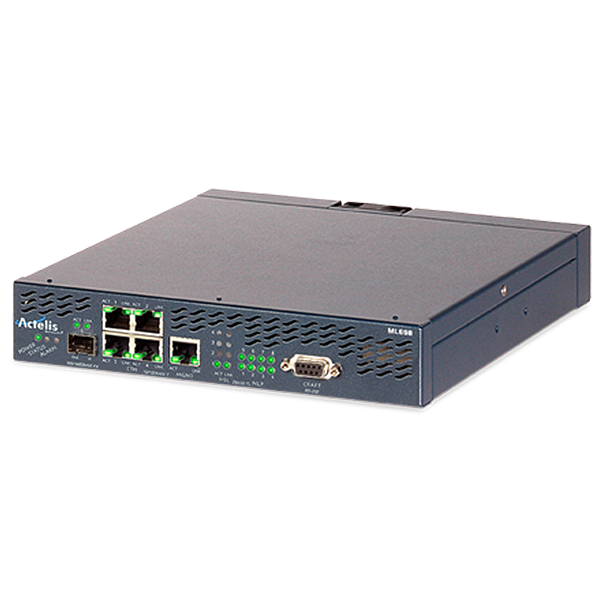Description
Ethernet Aggregator – ML698E
- Compact hybrid-fiber aggregator
- 4×10/100/1000BaseT
- 2×100/1000Base-FX
- 8 copper pairs
![]()
The ML690E Ethernet Aggregation Unit from Actelis® is an advanced intelligent Ethernet service delivery unit. Using the existing copper network, the ML690E can support up to 16 pairs / 4 HSLs and up to 230 Mbps of symmetrical Ethernet traffic at fiber quality over existing voice-grade copper. ML690E has two optional SFP interfaces supporting 100/1000Base-FX ports. It offers CE 2.0 services on all its ports – both copper and fiber.
The ML690E Aggregation unit can be deployed in a Multi-Point topologies with Actelis’ ML600/E Ethernet Access Devices. ML690E uplink can be fiber or bonded copper – copper when connected to Actelis Ethernet aggregation switches ML230/ML2300 or fiber when connected to any standard Ethernet switch including ML230/2300 units. With its superior performance, extensive functionality and low cost, the ML690E offers immediate CE 2.0 service delivery, and allows for further utilization of the existing network infrastructure.
The ML690E is interoperable with any standard Ethernet switch, router or hub. Compliant with Metro Ethernet Forum (MEF) CE 2.0 specifications, ML690E seamlessly integrates into carrier Ethernet networks. Equipped with four 10/100/1000Base-T Ethernet interfaces and two optional 100/1000Base-FX Small Form Factor (SFP) ports, the ML690E allows assignment of a service or a customer per port. DS3/E3 uplinks can be used to connect to legacy networks instead of the 100/1000Base-FX SFPs.
Service providers utilizing the ML690E intelligent can offer up to four CE 2.0 based services with comprehensive bandwidth control and traffic management features. The ML690E’s flexible service provisioning using Ethernet Virtual Connections (EVCs), along with its advanced mapping and Hierarchical Quality of Service (H-QoS) capabilities, allows carriers to maximize the efficiency of the access bandwidth on all their ports and configurations. Service Level Agreements (SLAs) can be easily enforced per each subscriber enabling service providers to safely aggregate multiple services or multiple subscribers, on the same Ethernet access uplink. For higher density two ML690E can be stacked in one RU 19” sleeve.
ML690E provides 802.1q VLAN-aware wire-speed bridging, double tagging (VLAN stacking) for end-user VLAN transparency, VLAN translation, L2, L3 and L4 classification with eight traffic classes, RSTP/STP, ERPS, bandwidth monitoring, Multicast/Broadcast limiting, as well as IGMP snooping for video distribution applications.
Powered by Actelis’ award-winning, patented EFMplus™ technology, the rate, reach and reliability are increased significantly using advanced Dynamic Spectrum Management (DSM) and Dynamic Rate Boost (DRB) techniques. EFMplus technology provides the best rate/reach performance and most resilient fiber-quality transmission, ensuring carrier-class reliability. When combined with Actelis’ industry leading XR239 EFM Repeaters, these technologies can extend reach even further.
The ML690E provides proactive and dynamic tools for enhanced trouble shooting and monitoring capabilities. Advanced Carrier-class OAM, including EFM OAM per 802.3ah , CFM (802.1ag) and , Y.1731 are supported by the product, offering both physical link as well as service level end to-end advanced troubleshooting mechanisms.
The ML690E can be managed In- and Out-of-Band by the MetaASSIST™. View graphical craft application and via the multiplatform Element Management System, MetaASSIST EMS. The management protocols include standard command line interface, Telnet and SNMP using standard MIBs for seamless integration with third-party Network Management Systems .

